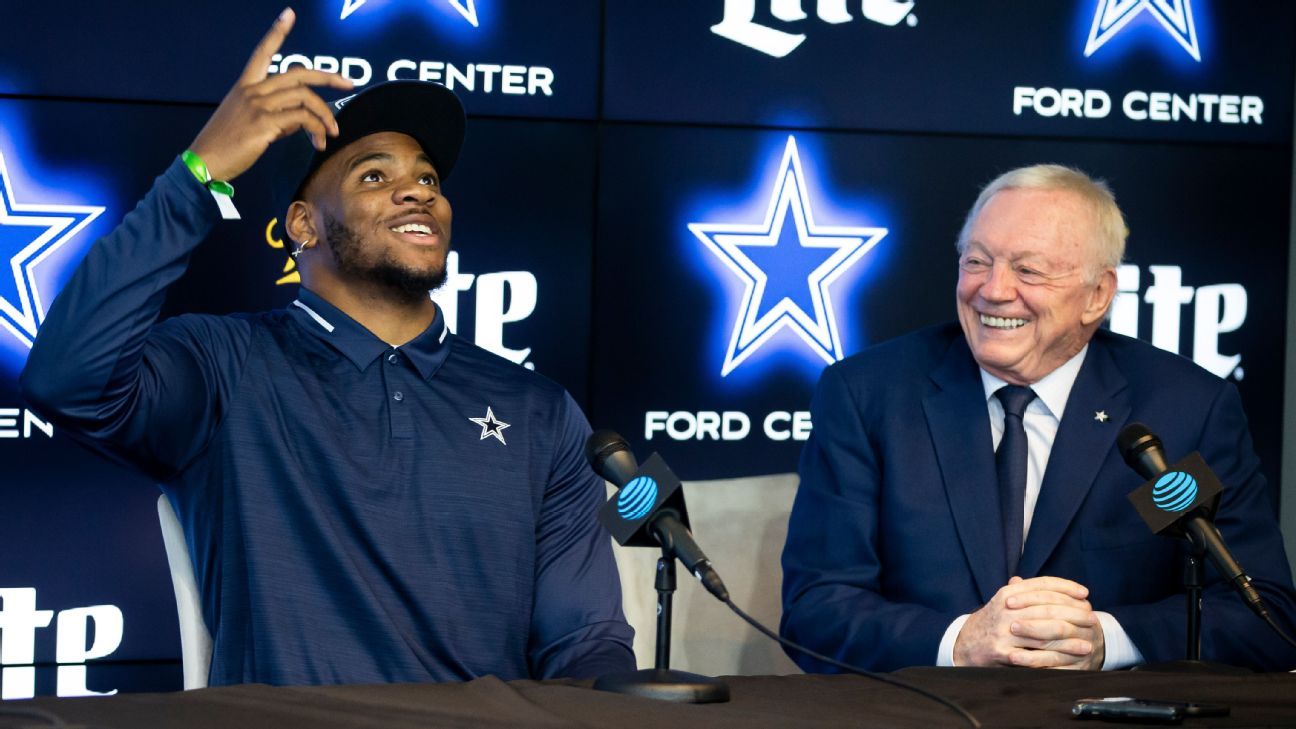
FRISCO, Texas — What was your lasting memory of the Dallas Cowboys’ defense from the 2020 NFL season?
Was it Cleveland Browns wide receiver Odell Beckham Jr. running through the Cowboys’ defense for a 50-yard run after catching a 37-yard touchdown pass from fellow wide receiver Jarvis Landry? Was it Lamar Jackson’s 37-yard touchdown run up the middle for the Baltimore Ravens as the Cowboys allowed 294 yards on the ground? Or, was it Christian Kirk’s 80-yard touchdown catch for the Arizona Cardinals in a Week 6 loss?
And, who could forget Antonio Gibson’s 23-yard touchdown run after an ill-fated fake punt decision in which the Washington Football Team running back derisively waved to Donovan Wilson as he crossed the goal line?
Maybe it was the time Mike Nolan had to pause a news conference because he got Tabasco in his eye.
After allowing a franchise-record 473 points and 6,183 yards in Nolan’s one year as coordinator, the Cowboys knew they had to make a drastic change in 2021 on defense.
It started in January with the hiring of Dan Quinn as coordinator and culminated over the 2021 NFL draft with a first in team history.
The Cowboys’ first six selections — linebacker Micah Parsons, cornerback Kelvin Joseph, defensive tackle Osa Odighizuwa, defensive end Chauncey Golston, cornerback Nahshon Wright and linebacker Jabril Cox — were defensive players. In 1982, the first five picks were defenders. In the Jerry Jones era, the most defenders selected to start a draft was four in 2012.
For the first time since the start of the seven-round draft in 1994, the Cowboys drafted eight defensive players (out of 11 total players selected).
“There are a lot of things you can interpret from this,” owner and general manager Jerry Jones said. “Unfortunately, we didn’t need to send any messages. It was pretty well known where we might need to do some addressing. … This has improved, the very best way we could, this team.”
The draft moves were not completely by the Cowboys’ design. Executive vice president Stephen Jones said Dallas considered an offensive lineman and wide receiver at different spots on Day 2 but ultimately opted to go back to the defense. Before the Cowboys selected Wright at No. 99, they very nearly opted to take Cox and were more than pleased to see the LSU linebacker available at No. 115.
“We still talked about a number of offensive players, but this is the best for our football team,” Cowboys coach Mike McCarthy said.
Dallas felt it needed to get faster defensively. Parsons ran a 4.36-second 40-yard dash, and Wright came in at 4.47 seconds. Cox ran in the 4.5s at his pro day two weeks ago, but his strength is his play in space.
The Cowboys added playmaking and size at cornerback with Joseph and Wright (6-foot-4). Mukuamu, who is also 6-foot-4, will move to safety from cornerback.
Parsons has the strength and speed to rush the passer but also the flexibility to cover. Cox was considered one of the draft’s best coverage linebackers. Odighizuwa can create pressure up the middle, while Bohanna can plug holes in the run defense.
Listen as the #DallasCowboys call @MicahhParsons11 to tell him that he is officially a 🤠
🔈 Secret Audio presented by @ATT pic.twitter.com/urj5ErZR8S
— Dallas Cowboys (@dallascowboys) April 30, 2021
“We came in looking to make us a bigger, longer, stronger, faster defense and a team,” Cowboys vice president of player personnel Will McClay said.
It was clear Quinn had an influence; just don’t call it a Quinn draft.
“It’s a Dallas Cowboys draft,” Quinn said. “I still would’ve been happy if we came in here and had eight offensive players and three guys. I was happy with the process. It’s just how the board fell. … Having players with the skill sets, now it’s up to us, OK. All the unique things that a player has, now you want to put them in a position where they can utilize those things. So, I’m looking forward to finding out what some of the superpowers are of what some of the guys have, and then create them and put them in the roles.”
McCarthy is an offensive coach. He was a quarterbacks coach before becoming an offensive coordinator before taking over as head coach of the Green Bay Packers in 2006. If he is going to lean one way — or offer to break a tie — most would think it would be offensively.
That the Cowboys leaned so hard defensively tells you what he thought of the group.
“Every year you have to take a hard look, and you either have to make changes, adjustments and emphasize and expand on what you’ve accomplished,” McCarthy said. “This is part of the change … and the advancement of how we want to look as a football team, how we want to play as a football team. And not only that, we want competition all the way through our building.”
